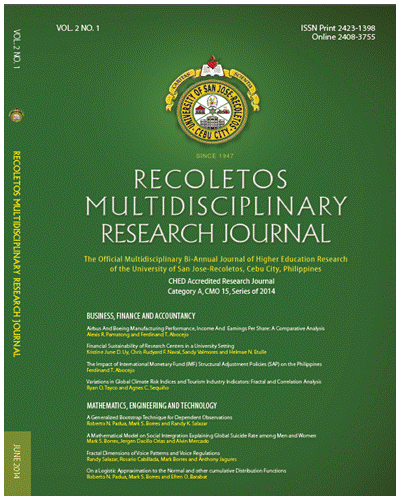Financial Sustainability of Research Centers in a University Setting
DOI:
https://doi.org/10.32871/rmrj1402.01.02Keywords:
university research centers, financial sustainability, research culture sustainabilityAbstract
The scarcity of research universities in developing countries, as well as the global acceptance of the need for research, has created a chasm that is currently attempted to be bridged by the presence of university research centers. Considering that research centers are primarily organized to foster research by bringing together faculty researchers from varied disciplines, revenue generation is not within its most immediate mandate. As such, they are often viewed as cost centers, placing them in the mercy of available government funding as well as budget allocations from the university that they belong to. This study endeavored to explore the financial viability of university research centers by projecting its results of operations from a set of reasonable assumptions. Composition analyses of its estimated revenues and expenses were performed. It was found out that, for a start up research center, the primary revenue sources were that of student research fees and the proceeds from the sale of research journals. Consequently, it was seen that substantial investments need to be made to develop the research culture of the institution and to have researchers. The study concluded that the operation of a research center in a university was found to be financially viable. It was further recommended that administrators of institutions of higher education must view university research centers as possible business centers, and that revenue sources must be explored.
References
Boardman, C., & Bozeman, B. (2007). Role strain in university research centers. The Journal of Higher Education, 78(4), 430-463.
Bozeman, B., & Boardman, C. (2003).Managing the new multipurpose, multidiscipline university research center: Institutional innovation in the academic community.
Corley, E., &Gaughan, M. (2005). Scientists’ participation in university research centers: What are the gender differences?Journal of Technology Transfer, 30(4), 371-381. doi:http://dx.doi.org/10.1007/s10961-005-2582-4
Gaughan, M., & Corley, E. A. (2010). Science faculty at US research universities: The impacts of university research center-affiliation and gender on industrial activities. Technovation, 30(3), 215. Retrieved from
http://search.proquest.com/docview/195862853?accountid=33262
Robbins, S.P., Waters-Marsh, T., Cacioppe, R. & Millett,B. (1994) Organizational Behavior: Concepts, Controversies & Applications, Australia & New Zealand Edition. Sydney: Prentice Hall
Ponomariov, B. L., & Boardman, P. C. (2010).Influencing scientists’ collaboration and productivity patterns through new institutions: University research centers and scientific and technical human capital. Research Policy, 39(5), 613. Retrieved from
http://search.proquest.com/docview/220088413?accountid=33262
Sabharwal, M., & Hu, Q. (2013). Participation in university based research centers: Is it helping or hurting researchers?. Research Policy, 42(6), 1301-1311.
Salazar-Clemeña, R. M., &Almonte-Acosta, S. A. (2007). Developing research culture in Philippine higher education institutions: Perspectives
of university faculty. Regional Seminar on Competition, Cooperation and Change in the Academic Profession: Shaping Higher Education’s Contribution to Knowledge and Research.
Sanyal, B. C., & Varghese, N. V. (2006, November). Research capacity of the higher education sector in developing countries.In Second International Colloquium on Research and Higher Education Policy, UNESCO Headquarters, Paris.
Winkler, J. (2014, January 30). University research centers: an opportunity or challenge for geography?.AAG.org. Retrieved March 20, 2014 from http://news.aag.org/2014/01/university-research-centers-anopportunity-or-challenge-for-geography/
Downloads
Published
How to Cite
Issue
Section
License
Copyright of the Journal belongs to the University of San Jose-Recoletos


